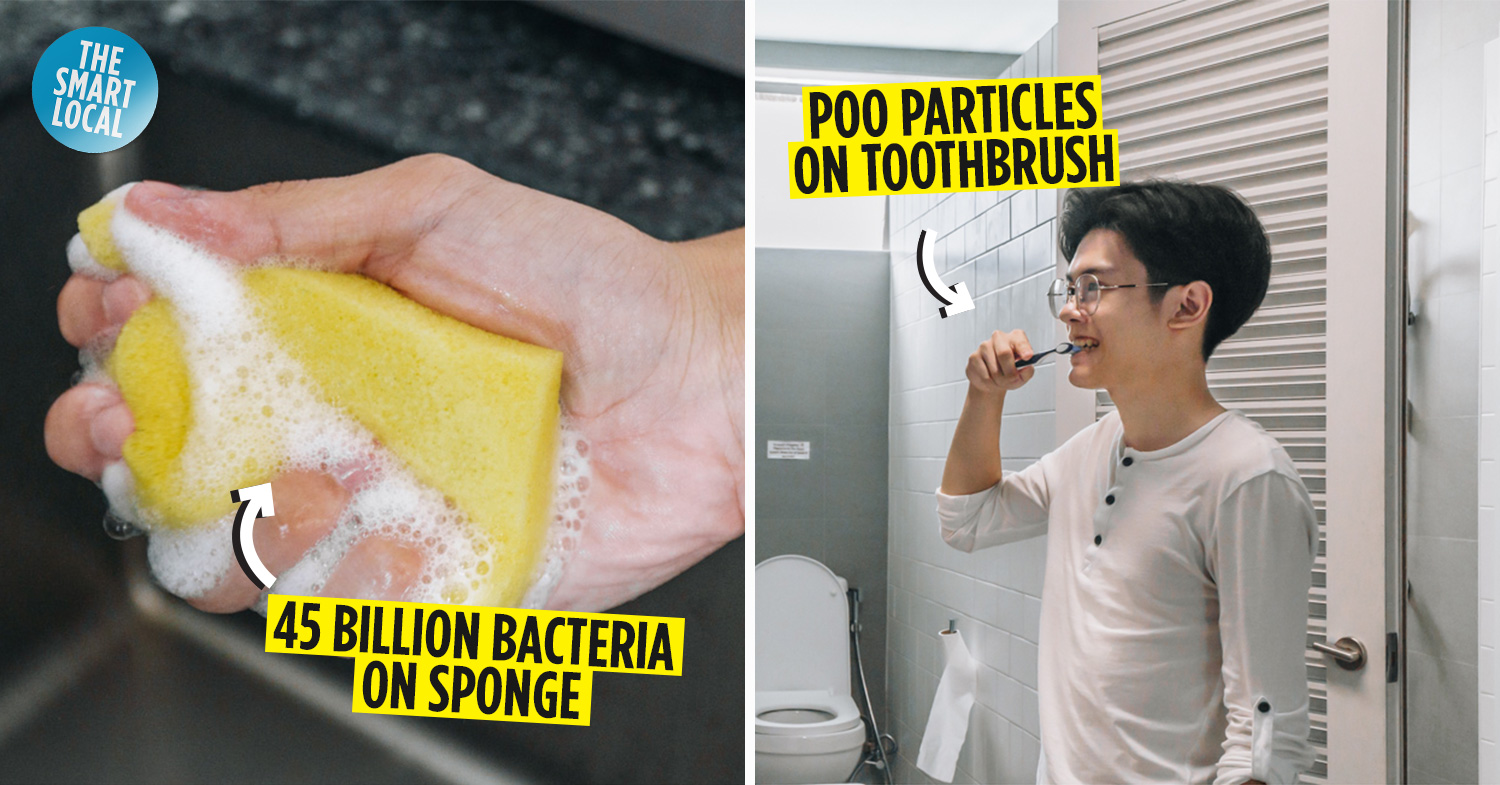Bacteria on household items
Many quickly jump to the conclusion that the toilet bowl is the germiest, dirtiest, most bacteria-infested item in the household. Sorry to say but that’s simply not true.
We can’t see bacteria with the naked eye, but microscopes can. There are seemingly harmless household items in your house right now that are housing hundreds of times more bacteria than your toilet bowl that you probably touch ten times more often. These germ-ridden items might not kill you, but they definitely warrant proper disinfecting every now and then.
Check out more articles on cleanliness here:
1. Tap handle
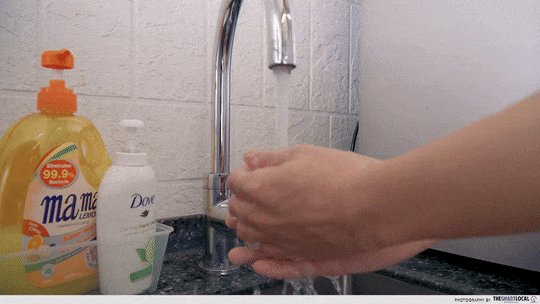
The tap gives you the power of water to clean other things, but don’t disregard the cleanliness of the tap itself. People use their dirty hands to turn the tap on, so it makes sense that there’s going to be a lot more bacteria on there.
Your kitchen faucet probably has all the germs from uncooked food, while the one in your toilet is most likely riddled with germs from those number twos. No matter the tap, studies have shown that bacteria like E.coli are probably tap dancing all over them.
How to clean: Use a disinfectant spray, cleaning liquid or wipes regularly. Alternatively, you can also use citric acid or a solution of vinegar and warm water.
2. Kitchen sponge
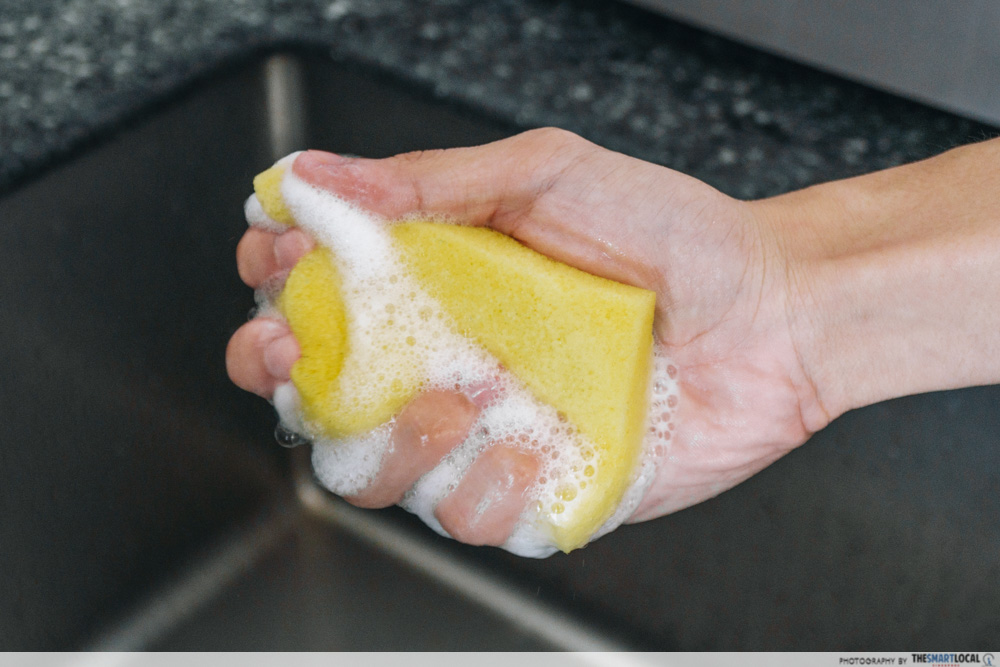
Have you ever stopped to think that while some have separate knives or chopping boards for raw and cooked food, the sponge is the tool that we ultimately use to wash everything?
If you think that just because you put soap on the kitchen sponge to clean it every day it’ll be clean, think again. Unfortunately, vigorous scrubbing just ain’t gonna get rid of all the bacteria that spreads on contact with the dirty dishes. Not only that, since your hands handle so many different foods and ingredients, the sponge gets contaminated when you pick it up.
There are 45 billion bacteria per square centimetre on your kitchen sponge. That’s roughly 8 times the population of Singapore crammed into a square centimetre. Don’t compromise on the dirty sponges, just get new ones.
How to clean: Put the wet sponge in a microwave for two minutes or place it in boiling water for five minutes and replace regularly.
3. Toothbrush

Here’s a not-so-fun-fact, when your toothbrush is close to your toilet, faecal matter a.k.a. poop particles can actually fly out and about and onto your toothbrush after every flush. Objects up to 2 metres away are in the “splash zone”.
That’s not even the worst part, it’ll send shivers down your spine knowing that over 100 million types of bacteria including Staphylococcus aureus, E. coli, Pseudomonas, and herpes simplex virus have been found by researchers to contaminate toothbrushes. Time to do some interior repositioning in the bathroom, especially if you share one with other people.
How to clean: Keep toothbrushes upright so water trickles down, don’t keep near the toilet bowl or close the lid before flushing and replace toothbrush every three – four months. Alternatively, get a toothbrush cover to protect the bristles.
4. Toothbrush holder
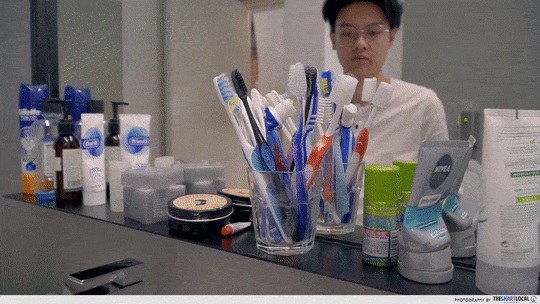
Even if you replace your toothbrush regularly, it might all be in vain if you forget about your toothbrush holder. It’s a breeding ground for germs, especially so if you are sharing one with your family or housemates as everyone’s collective bacteria build up.
Toothbrush holders rank high among the most bacteria-infected things in the household according to a study from the National Sanitation Foundation, with 27% having coliform bacteria – a bacteria typically present in human and animal faeces. Go wash yours if you haven’t already.
How to clean: Wash regularly with hot soapy water and make sure to scrub out all that grime.
5. Washing machine
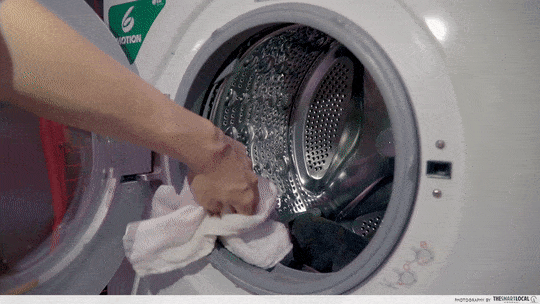
The outside of the washing machine might get a scrub during your weekly household cleaning, but most tend to forget that the inside needs some attention too. Your clothes have been, well, virtually everywhere, so it makes sense that it’d be a breeding ground like no other in the washing machine tub with all the mould and dirt piling up.
A German hospital reported a new drug-resistant bacteria causing trouble to patients and eventually they figured out the source – you guessed it – the hospital washing machine. Yikes.
How to clean: Wash on high heat with vinegar or bleach to disinfect. Alternatively, grab a washing machine cleaner from Daiso.
6. Bath towels
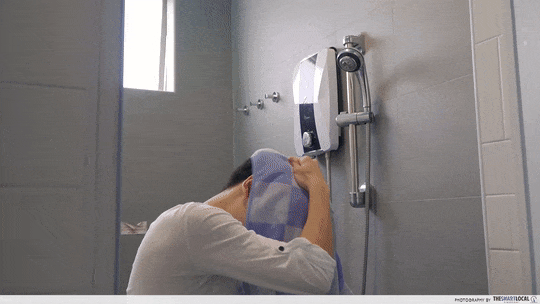
Your bath towels are wet, damp, stored in a dark place and are like a nice, comfy bed for all sorts of bacteria. Also, you probably use them many times over the day to wipe your hands, wash your face and dry your body – that’s a lot of skin contact.
It’s been found that 90% of bath towels have coliform bacteria and 14% with E.coli. You wouldn’t want to be getting any of that on your skin – just think about all the possible facial and body acne issues you’d have to face.
How to clean: Let them dry completely before use and wash after every two – three uses.
7. Cutting board

Image credit: pxfuel
This should be a no brainer as the chopping board comes into contact with raw meats and dirty vegetables all the time. A good scrub and some dishwashing liquid may get rid of most germs, but the real danger lies in the grooves that form after relentless cutting and chopping as bacteria thrive and linger in these mini-ravines.
There’s a big debate surrounding whether plastic or wooden boards are more sanitary, but it turns out that they’re pretty much the same when it comes to both in-groove bacteria as well as cleanliness. Regardless of what you have, clean them properly because bacteria on your food ain’t groovy.
How to clean: Sanitise with vinegar or bleach, replace if it’s too worn out with a lot of grooves.
8. Keyboard
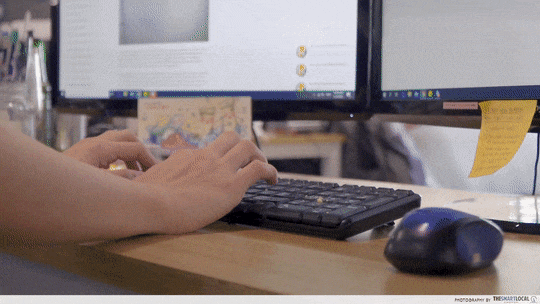
Imagine everywhere your fingers have been. Now imagine all those germs and bacteria harbouring on, and within, your desktop keyboard. Apparently, researchers have found that your keyboard contains 400 times more bacteria than your average toilet seat. Oh, not to mention a few drug-resistant bacteria that can last up to 24 hours too.
The same applies to your laptop keyboard. In fact, your laptop’s keyboard might be even worse considering how often you use it outside the confines of your home.
How to clean: Wipe and disinfect them regularly, not forgetting to go under the keys if you can, and wash hands after use.
9. Mops
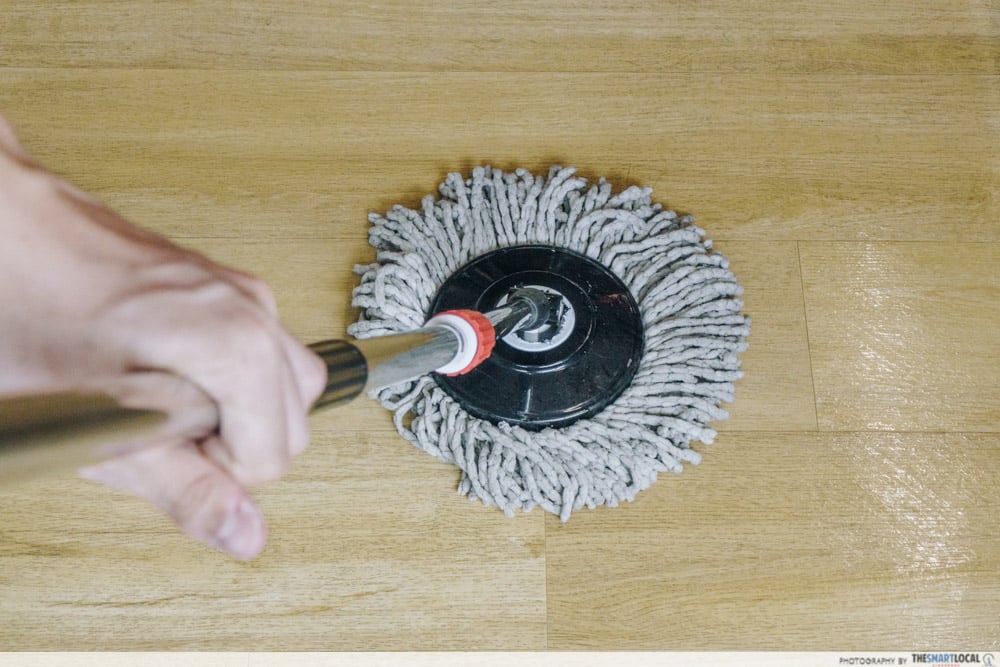
They’re supposed to clean your house but if you’re not careful, you might end up dragging more bacteria around instead. Mops are wet and damp and we’ve established that such conditions are the perfect habitat for bacteria.
Mop storage is also essential as mops that are stored wet actually help bacteria grow rapidly. I’m sure you’ll want to avoid spreading germs everywhere.
How to clean: Wash thoroughly after use, let the mop dry and be sure to store in a dry place. For those living in HDBs, hang it from the laundry pole holder for a good UV cleanse in the sun.
10. TV remote
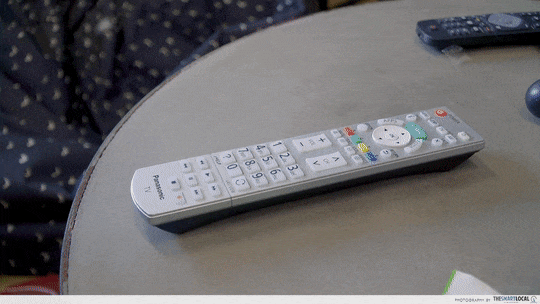
The list of things that the TV remote has touched includes your dirty hands, the coffee table, the couch if you put it there and the floor if you drop it. Coupled with the fact that it’s often neglected as an item that needs cleaning, you’ve got yourself yet another germ hotspot.
The American Society for Microbiology has concluded that remote controls are among the most bacteria-carrying items in hotels. Keep that in mind the next time you book into a hotel.
Same applies to your PS4 or Xbox console remotes too. It’s your call of duty to ensure you and your friends don’t end up with a handful of germs after that gaming sesh.
How to clean: Use disinfectant wipes regularly.
Bacteria hiding in household items
Don’t panic too much about these items, they won’t kill you or warrant incineration. But leaving these bacteria-ridden household things will be harmful in the long run, so be sure to cover all grounds during your annual spring cleaning.
Check out some related articles:
- First aid hacks with household items
- How to choose a good mask
- Hand sanitiser mistakes
- How to get rid of lizards at home
- Hairstyling tips with household items
Photography by Alif Muhammad.
Originally published on 9th March 2020. Last updated by Josiah Neo on 11th August 2021.
